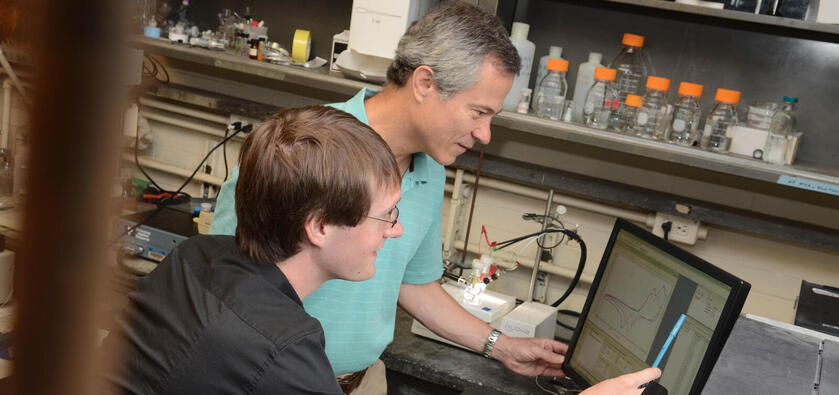Finding a Research Opportunity
You are here
Yale Visiting International Students Program has Officially Closed
The Yale Visiting International Students Program (Y-VISP) has officially closed. No applications will be accepted. Interested students are encouraged to instead check out Yale Summer Session and the Yale Non-Degree Students Program.

Finding a Research Opportunity at Yale
Many Y-VISPs are interested in finding a research opportunity while participating in Y-VISP. But how can you find such an opportunity? Here are some words of advice from Y-VISP alums.
When ideally should students start looking for a research opportunity at Yale?
I think the summer/winter break before the start of the semester is a good time to reach out to professors. Professors tend to be more available to read through your email and reply during breaks.
Don’t be afraid to send cold emails to professors. I would say more half of the time you will not receive a reply. That’s completely normal given their busy schedule. So do have more than one options and just reach out to all the professors that you would like to work with.
-Yang Xiao, Yale-NUS, Y-VISP Spring 2020
Research takes forever to materialise (conceptualisation, logistics, DSRB approval… the list goes on)... I started looking for research opportunities months in advance of arriving at Yale (May!).
-Ann Hui, NUS, Y-VISP 2018-19
For opportunities during the semester, you may reach out to professors and express your interest. The job portal also releases new RA positions frequently. In addition, there are a few undergraduate research programs during the summer. Application starts at around March... consider your research interests, do some reading, and even talk to the professor before submitting your application.
-Lixing Liang, HKU, Y-VISP 2016-17
How did you identify which professors or others to reach out to about an opportunity?
Each department at Yale has a detailed list of professors and their research projects on the website... students should go through the departmental webpage and look for professors with matching research interest. Another way is to talk to Y-VISP alumni or friends at Yale as they would have had some experience or heard something about a specific professor. Generally professors at Yale are very open to discussing potential research projects with undergraduate students. Even if they don’t have any open position for you, you should ask if you can join their group meetings. You can learn a lot from simply participating in their group meetings.
-Yang Xiao, Yale-NUS, Y-VISP Spring 2020
Read their papers to see if they interest you! Also, you can ask Professors you know in your field of interest to recommend any Professors you may be interested in.
-Yale-NUS student
I found development economics and international trade fascinating and started exploring opportunities in these areas. From there, I read some papers to see how Yale faculties contributed to these topics. Chatting with Yalies interested in these topics was also very helpful. The professors at Yale were very approachable, and were kind enough to offer time, guidance, or even opportunities to work with them!
-Lixing Liang, HKU, Y-VISP 2016-17
Other Advice
Make sure that you convey your objective clearly when you ask for research opportunities. Is there any specific training that you would like to receive? Or is there a question that you would like to work on? Professors don’t have the time to get to know you in depth so it will be beneficial to just ask for specific training/project that fits your interest.
-Yang Xiao, Yale-NUS, Y-VISP Spring 2020
Find your passion: For undergraduates, sometimes it feels challenging to find your academic area of interest. But that’s fine – no one can know for sure, and interests may also change over time. But you can try to feel and experience – what kind of questions do you usually wonder? What topics would you read tirelessly even at midnight? Is there any paper or idea that you can just say “wow” after reading it? Deep in your heart you may already know the answer.
Be open to new ideas: Don’t turn your back on all ideas that don’t interest you at first glance. While it’s good to have a preference or focus, there might be areas that you may have overlooked.
Be confident: Don’t feel too stressed. You will sure find the research opportunity of your dream, given you’ve been working hard for it!
-Lixing Liang, HKU, Y-VISP 2016-17
Research opportunities will come naturally... That means, reading around the topic and keeping abreast of what’s happening, and asking questions that you can then bounce off professors when you finally meet them.
Know what you want to do, now. Don’t be worried about being certain if this is what you will be doing decades from now – you are still young and you can still change... You are not expected to have a 10 page research proposal, just a start is enough. I attended lab meetings at the Human Nature Lab too, just to see how a quantitative approach to sociology would look like. I met professors just to chat about ideas even if I didn’t take their classes.
...create your own opportunity... after a face to face research meeting with my mentor in my first fortnight at New Haven... I spent maybe my first two months in New Haven, just conceptualising a project.
Be prepared to work ridiculously hard, but only if that’s what you want. Know what you want from your year at Yale – looking back I do think I spent a disproportionate amount of time doing research... missing out on trips to Utah and Niagara falls. My health declined from neglect, and to be honest, I’m not sure if I entirely recovered from the sheer work. Of course the hard work was not in vain, I had an incredibly productive year of research, but I do wish I at least “worked out” at Payne Whitney (which was literally across the street from Morse) once before returning.
-Ann Hui, NUS, Y-VISP 2018-19
